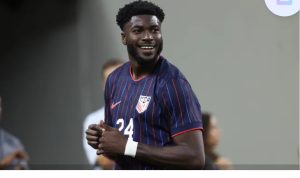
These Playoffs Are Making the Bulls’ Ultimate Deficiency Even More Painfully Obvious.
As the 2025 NBA Playoffs unfold, one thing becomes abundantly clear to even the most casual of Chicago Bulls fans: this team’s glaring deficiencies are no longer just issues to solve—they are existential flaws. While other teams have elevated their game to meet the league’s increasingly dynamic standards, the Bulls remain stuck in a model that feels outdated, imbalanced, and fundamentally flawed. These playoffs don’t just highlight the Bulls’ weaknesses—they magnify them.
The most painful deficiency, perhaps, is the lack of a true superstar. In today’s NBA, success in the postseason hinges on having a franchise player capable of taking over games. From Luka Dončić in Dallas to Jayson Tatum in Boston, these playoffs are filled with stars who can swing a series on their own. The Bulls, meanwhile, rely on a roster built around solid players like DeMar DeRozan and Zach LaVine—neither of whom consistently plays at the level required to lead deep postseason runs. DeRozan, while a master of the midrange and a steady veteran presence, is aging and lacks the explosive scoring or three-point efficiency needed to thrive in the modern playoff environment. LaVine, though immensely talented, has never quite made the leap to becoming an elite two-way player or proven himself as a dependable leader when the stakes are highest.
More broadly, the Bulls’ roster construction reflects a team unsure of its identity. The front office has failed to fully commit to either a rebuild or a win-now mentality. This “stuck in the middle” approach—marked by a mix of aging veterans, injury-prone stars, and young players with unclear roles—has left the team without the cohesion or direction necessary to compete with the NBA’s elite. While other franchises, like the Oklahoma City Thunder or the Sacramento Kings, have leaned hard into youth development or found creative ways to rebuild through the draft and savvy trades, the Bulls have instead patched holes with short-term fixes. The result is a team good enough to flirt with a play-in spot but never good enough to be taken seriously as a contender.
Another brutally exposed weakness is the team’s lack of three-point shooting and offensive versatility. The modern NBA prioritizes spacing, ball movement, and shot creation from deep. The Bulls, in contrast, remain one of the league’s least threatening teams from beyond the arc. During the regular season, they ranked near the bottom in both three-point attempts and makes. Come playoff time, that kind of offensive profile simply doesn’t cut it. When defenses tighten and possessions become more valuable, teams that can stretch the floor and knock down shots consistently tend to prevail. Chicago’s outdated offensive schemes, heavy reliance on isolation plays, and poor floor spacing have been exploited repeatedly, especially when facing teams that thrive on switching defenses and perimeter pressure.
The defensive end is no brighter. Though the Bulls have flashes of solid team defense—thanks in part to players like Alex Caruso and Patrick Williams—the lack of a reliable interior presence or dominant rim protector severely limits their ceiling. Nikola Vučević, while a skilled offensive big, remains a liability when it comes to defending elite post players or protecting the paint against relentless drives. Against physical, playoff-hardened frontcourts, the Bulls too often give up second-chance points, fail to close out possessions, and struggle with defensive rotations. It’s not just about personnel; it’s about scheme and intensity—two areas where other playoff teams are currently outperforming Chicago by a wide margin.
Even more damning is the Bulls’ stagnation in player development. Young prospects such as Coby White, Dalen Terry, and Patrick Williams have shown flashes, but none have broken out into consistent, high-impact contributors. That stagnation suggests not just a failure in scouting, but a systemic issue in how the organization nurtures and develops talent. In contrast, teams like the Miami Heat, Denver Nuggets, and Golden State Warriors have continually turned late draft picks and undrafted players into playoff contributors. The Bulls, meanwhile, have failed to cultivate a strong bench or empower their young core to take meaningful strides.
In the broader context of the Eastern Conference, the Bulls’ trajectory looks even more disheartening. With teams like the Celtics, Bucks, Cavs, and Sixers boasting young stars, deep rosters, and clear long-term plans, Chicago appears to be standing still. And with new challengers like the Magic and Pacers on the rise, time is quickly running out for the Bulls to pivot and find a coherent direction.
Ultimately, these playoffs are not just highlighting Chicago’s shortcomings—they are forcing a reckoning. The Bulls are not one piece away; they are an entire blueprint away. Whether it’s the lack of a superstar, outdated offensive strategies, or poor player development, every deep playoff game serves as a harsh reminder of how far the Bulls truly are from being relevant again. Change is not optional—it’s urgent.






